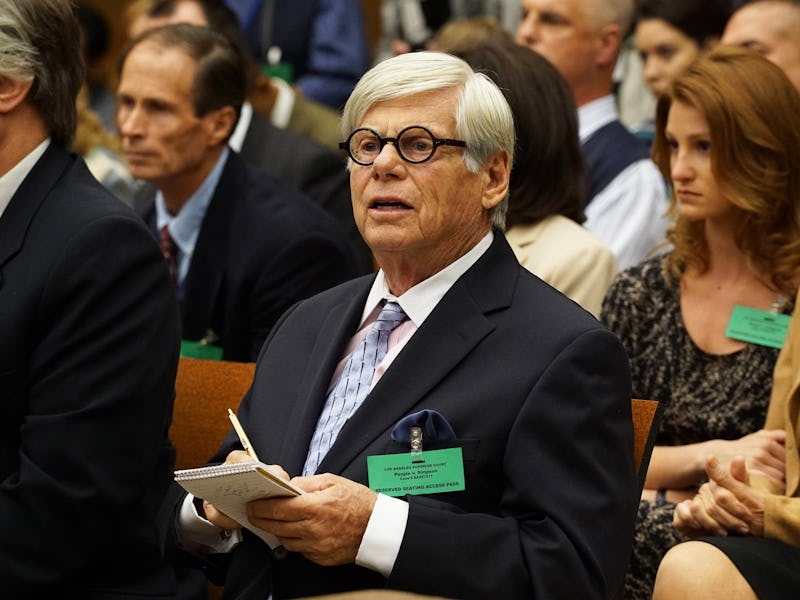'The People v. O.J. Simpson''s Mark Furhman Tapes Episode is Fictionalized Truth
Episode 9 is an imagined version of events, but the Johnnie Cochran/Lance Ito/Darden interaction is worth it.

When Vanity Fair journalist Dominick Dunne (Robert Morse) rushes out of the Simpson courtroom, after learning the Fuhrman tapes may be grounds for a mistrial, he splutters: “You couldn’t get away with this plot twist in an airport paperback.” In the context of *The People v. O.J. Simpson,’ it sounds like ironic meta-comment. It’s a Ryan Murphy-esque winking reflection on how the show, in its guise of a serial crime drama, feels like gross hyperbole. But in actuality, the whole farce (the “circus,” as Sterling K. Brown’s Chris Darden puts it earlier in the episode) is all true, and mostly video-documented.
That said, much of the drama in the show has been conjured from speculation. The backroom talk, which was not all documented in the international media, is at least partially an invention, inspired by snippets from tell-all memoirs and interviews. But The People v. O.J. Simpson fudges courtroom details too, and this week the series made its most glaring revision in the chronology of the trial. The benefit of the chancy maneuver (“we were all watching!” one might say) was delivering one of the most unforgettable dramatic moments in the series so far, at the epicenter of its most charged episode.
The drama of “Manna From Heaven” centers around the recordings of Mark Fuhrman (Steven Pasquale) muttering racial epithets and gleefully bragging about police misconduct to the public and the jury, which could destroy jurisprudence in the O.J. courtroom — or, at least, lend credence to the defense’s intimations of conspiracy. With the racist detective caught condemning and demeaning Judge Ito’s (Kenneth Choi) wife on the tapes, however, the question of how much of this material should be put into evidence becomes more complicated.
To pressure the court into introducing all 13 hours of tape, Johnnie Cochran (Courtney Vance) gathers a coalition of leaders in the African-American community of Los Angeles, who appear in press conferences, hinting at a reprise of the backlash to the Rodney King verdict. Racial tensions had only been running hotter and hotter, since the introduction of the n-word into the courtroom during Fuhrman’s original testimony, and in last week’s episode, when the jury came close to mutiny over the pruning-off of jurors.
And so it seems logical to place the moment when protocol in the O.J. court almost crumbled at this point in the drama. As Shapiro (John Travolta) puts it to Johnnie, the city is “about to explode,” not just the courtroom. The pressures and humiliation Chris Darden feels are palpable every moment Sterling K. Brown is on camera — murmuring, clenching his jaw, eyes watering slightly. It makes a great deal of dramatic sense for Darden to essentially tell off both Ito and Cochran out of turn in The People V. O.J. Simpson, just following Ito’s ruling in the defense’s favor about the Fuhrman tapes. The issue of Fuhrman turned him against Marcia early on, and now again. He never felt right about the witness in the first place; now he was the sword the state’s case, clearly, was going to fall on. He insults Ito’s leadership directly, and is almost held in contempt. Clark is forced to speak in his defense.
And yet, this didn�������������������������������������������������������������������������������������������������������������������������������������������������������t happen. Most of the lines in The People v. O.J. Simpson are taken mostly verbatim from proceedings that occurred almost two months earlier in a much more minor Cochran dust-up (now preserved online). Marcia’s line about taking off her watch and jewelry is borrowed from a claim Darden made in his memoir In Contempt. In last night’s episode, the final mic drop is Darden walking out of the courtroom when Fuhrman enters it, which also did not occur.
Should this fudging — the most drastic of the series in terms of courtroom activity — really be cause for objection? To those who obsess over fact-checking the FX show, it may seem unnecessary. But the truth is this show — at least, at its best — has been about the dizzying slew of racial issues that this case touched upon. Since at least John Singleton’s episode “The Race Card,” the smouldering tension between Cochran and Darden has been the show’s most compelling element. Rather than dramatizing what people already know, shaping this show — still, based on threads and moments from a cornucopia of accounts and real moments — in the service of their respective struggles is where the true artistry of Scott Alexander and Larry Karaszewski’s show comes in.
If The People v. O.J. Simpson sensationalizes the trial, it does so much less than the media did at the time of the trial, and toward a purpose that is noble and important. The immutable racial conflicts, paradoxes, and tragedies it focuses on — usually, over the subjects of more soap-opera-y speculations that dominated the tabloids — are apropos of 2016, as well as 1995, and distant past. They cast their shadow over everything here; they warp the specific truth. They warped it for the jury, and psyched out nearly everyone involved with the case. They continue to trouble the world. This show wouldn’t work without distortion, without hindsight pushing back, thoughtfully, on the elements in which we were too absorbed into really have any perspective.